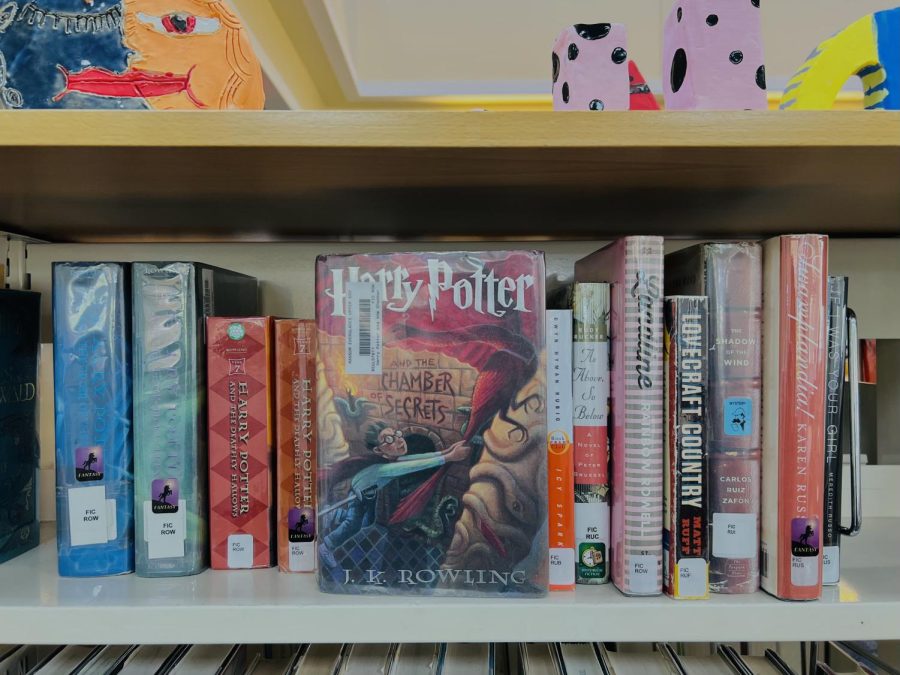J.K. Rowling and the Chamber of Controversy
In the wake of Rowling’s ‘TERF’ wars, RE Harry Potter fans struggle to separate the art from the artist
Who is J.K. Rowling?
Besides being the wealthiest author in the world, the writer of the highest-selling book series in the world, a renowned philanthropist, and a patron of creativity, she is also a self-proclaimed TERF: a trans- exclusionary radical feminist. As Sabrina Soto ’22 explained, Rowling and other TERFs believe that including transgender women in the modern feminist project takes away from focusing on the strife of cisgender women.
Rowling’s TERF support began in a tweet in December of 2019, where she defended Maya Forstater, a woman fired for ignoring her coworkers’ requested pronouns. Then, in June of 2020, she tweeted that only menstruating people or cisgender women are to be considered women, therefore excluding the transgender population.
Her opinions have divided her fandom. Yael, a transgender woman and former fan of Rowling, said that “when she said all these things that were bigoted and directly harmful to me, it made me really sad because I had relied on Harry Potter for so long as an escape, only to learn that JK Rowling didn’t accept me.”
Since the tweets, many of her once loyal friends and devoted fans began crusades of condemnation. The Harry Potter franchise’s three main stars, Daniel Radcliffe, Emma Watson and Rupert Grint, publicly denounced Rowling, inciting many of their fans to follow. Some have even compared her to her evil creations, Voldemort and Dolores Umbridge.
Publications and airings of works linked to Rowling have excluded or minimized her name in credits, distancing her as far as possible from her works. Hundreds of activists and aggrieved fans have sent death, rape, and bomb threats. Alongside the efforts to cancel her, however, many fans have come to her side, attempting to shift the conversation away from her rhetoric by highlighting her positive contributions.
Rowling turned to her personal blog for exoneration, where she claimed that her opinions formed after escaping an abusive relationship and surviving sexual assault. She doubled down on her view that feminism could not include transgender women in the movement because it must keep “natal girls and women safe” and avoid “the erosion of women as a political and biological class.” Yet she also expressed her desire to keep transgender women safe and fight for their rights, simply with an entirely different approach than the fight for cisgender women.
As the controversy surrounding Rowling has unfolded, it has begged a question of the RE community: how should fans of her work approach her views? For students who have grown up with Harry Potter, do the words of the author taint the art?
Leo Fein ’23, a fan of Harry Potter, said that separating the author from the work is tricky, but that in the case of Rowling, “you can praise Harry Potter and abstain from saying good things about J.K. Rowling.”
Similarly, although Yael has her conflicting views, she said she “will not stop reading Harry Potter,” even if she “will not give [J.K. Rowling] any more money or support.”
Lily De Araujo ’21 said that “Rowling has more money than she knows what to do with and will have a die-hard fanbase regardless of her inflammatory statements.” She said that by boycotting her merchandise, “I’d just be prohibiting myself from enjoying a franchise that largely shaped my childhood. If by boycott you mean stop reading her books, I’m kind of torn.”
For some, the question of whether to boycott a controversial author’s works comes down to whether their views surface in the texts themselves. In many English classes at Ransom Everglades, students research the author prior to reading a given work to help understand the context around it. Many educators and readers consider it essential to recognize an author’s possible prejudices and how they might inform the works they create.
Mr. Branly Fontaine, the Upper School Librarian, believes that Rowling’s controversial opinions are not reflected in her works, however. He said that Harry Potter has a good message of “an outside being welcomed to a world where there are others just like him.” Through Harry Potter, he explained, Rowling conveys messages against racism, classism, and sexism, which can outweigh her negative stances on transgender inclusion.
At the same time, De Araujo pointed out that “Harry Potter has had a huge cultural significance, and it seems a shame to let Rowling ruin that. … To be honest, there are tons of other amazing books out there, especially ones not written by people who imbue it with moral decay.”
J.K. Rowling’s adoption of TERF ideals also begs the question of whether her characters can truly be considered feminist icons. Many young readers, particularly those who identify as women, look to the character Hermione for inspiration. She is confident, brilliant; she proves to those readers that women can do anything their male counterparts can do, if not better.
Soto said that Rowling’s beliefs do not alter her characters, and affirmed that if she reread the books, she would still idolize Hermione.
Mr. Fontaine recalled researching the abuse Rowling endured and gaining new respect for her as a survivor. “That probably is her in her characters, growing and gaining confidence,” he said.
If disavowing Harry Potter is not necessarily the answer, then how should allies fight the rise of TERFs and transphobic rhetoric? “Education certainly helps,” Soto said—as does ‘deplatforming’ a figure like Rowling even if audiences continue to enjoy her work. “[Agents of hate] do not deserve to have a platform, and people in general should stop interacting with them,” she said.
At the same time, critics of ‘cancel culture’ also believe that isolating and socially expelling someone from their public platform breeds a sense of resentment and a refusal to seek forgiveness. Such values, to these critics, are crucial to true progressivism, which aims to promote learning from mistakes and one another.
“People should be called out, but [Rowling] is a great writer, so by canceling her, you’re then cutting off her creativity,” Mr. Fontaine added.
Some, especially transgender women and allies like Yael, argue that Rowling is unable to achieve public redemption. “If she profusely apologizes about [her transphobic comments] and openly speaks about the trans community in an educated and positive way,” she said, then perhaps Rowling can make amends with the LGBTQ+ community. “I personally don’t think that she will,” she added.
De Araujo believes it is up to the people her rhetoric has harmed to forgive Rowling for her comments—if Rowling ever chooses to walk them back. Some might accept an apology; others will demand actual action. “I personally would need her to take some strides to undo the damage that she’s done to the trans community, what with her being such a prominent figure, especially among younger, more impressionable people,” she said.







